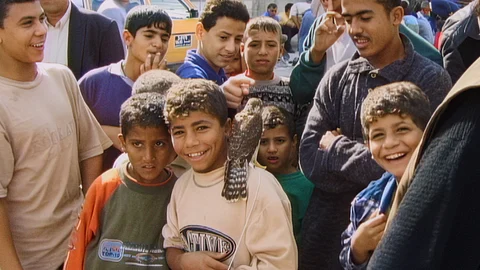

Kamal Aljafari’s documentary With Hasan in Gaza begins with a recitation against a blank, dark screen that talks about how blood falls in abundance in Palestine like the December rain, it flows freely like the ever-flowing Jordon river. The film ends with another discourse, from the point of view of the Palestinians in exile, about making a return—no matter how long that journey takes—to the land that nurtured them and from where they have been absent for long.
In between lies a unique tale about the past implicitly seen through the filter of the present. One that doubly underscores the enormous loss experienced through the passage of time and some agonizing continuities that refuse to end. It reignites the somnolent, painful memories, of even the happy moments, deliberately tucked away, deep in the recesses of the mind.
The film, its theme and form have taken shape through the accidental rediscovery of three MiniDV tapes from back in 2001. These were recordings of Aljafari’s road trip from the North to the South of Gaza, along with the local guide Hasan Elboubou, looking for a prison mate of his from 1989 when he himself was 17 years old.
Aljafari intended it to be the material for his debut film that never got made but became the source of conception and helped give birth to this film—With Hasan in Gaza—twenty five years down the line. “This is my first film, which I have never made,” says Aljafari of the footage.
There are two timelines to the film. One is the recollection of the late 80s, the time of the first intifada (the Palestinian uprising against Israeli occupation of the West Bank and Gaza), through the voiceover with Aljafari recalling the trauma of his wrongful imprisonment as a teenager, watching the fall of the Berlin wall on a prison TV, trying hard to catch the signal on the transistor to hear music and keeping a notebook of wishes in 1990. He remembers his childhood in Jaffa and of visiting relatives in Gaza and how down the years even the controlled movement of the Gazans came to a total halt. He describes Gaza as “the largest prison in the world… impossible to visit, impossible to leave”.
The second timeline is that of 2001, the second intifada, with Aljafari’s handheld, on the move camera and the raw unprocessed images giving us a ringside view of daily life in Gaza at that time. The fresh vegetables and the catch from the sea in the wet markets get juxtaposed against the narrow alleys and bullet ridden and missile hit buildings. The stores lying closed in the face of the terrible economic crisis since the intifada stand in contrast to the smiling children swimming and playing by the sea. The palm trees stand shoulder to shoulder with demolished homes and men continue to be glued to sports telecasts on television despite the sound of bullets outside. Life in the midst of death.
Irony is that this cinematic search for a man lost to time and war back in 2001, captures a slice of life in Gaza, which no longer exists and yet it holds a mirror to the continuing violence and bloodshed, the bullets and shrapnel, the steady, ongoing erasures, sudden disappearances, deaths and dissolution of a land and people, society, civilisation and culture. And, most so, the ineffectiveness of the UN in being of any consequence.
Noone knows what happened to Hasan. Most significantly, the smiling, joyful children, insisting on being filmed, lend the most poignant underpinnings to the footage with the inevitability of us seeing their happy faces in the light of the present day killings and maiming of young lives. They send a chill down the spine.
As does the rage of the women—the angry mothers—complaining how the firing from the Israelis never stopped despite the ceasefire, how they’ve been displaced and left homeless, how they haven’t been able to sleep since the start of the intifada. “What kind of a life is this? This is not life?” says one, little knowing what it would mean watching her in 2025 during the current humanitarian crisis in Gaza.
A Palestine, Germany, France, Switzerland, Qatar co-production, With Hasan in Gaza is about defiance in captivity. Aljafari calls it “an homage to Gaza and its people” and a film about “the catastrophe, and the poetry that resists”. That alone makes it worth a view despite the--perhaps deliberate--choppy, jagged narrative and the coarseness to the filmmaking.